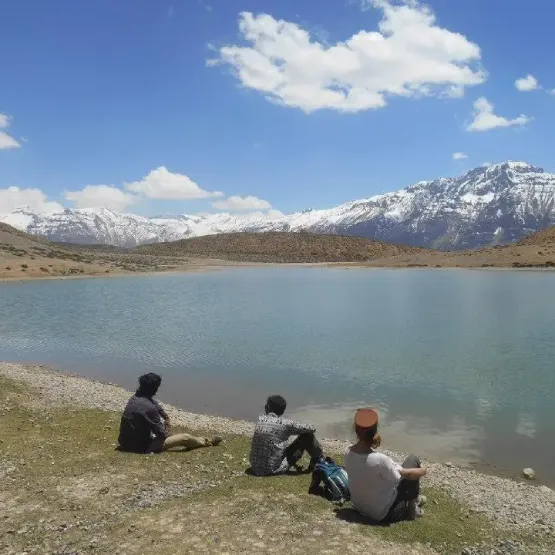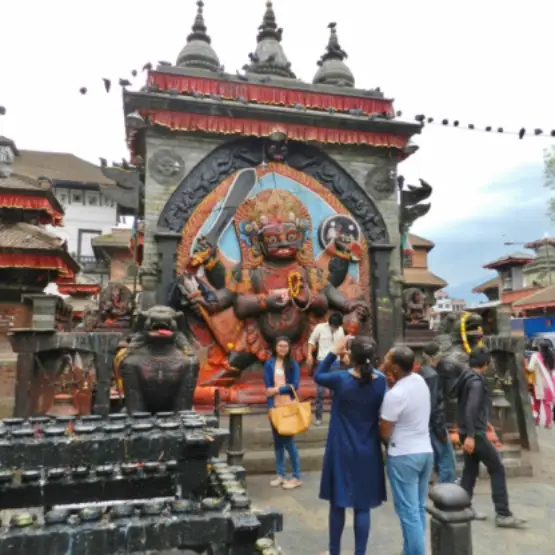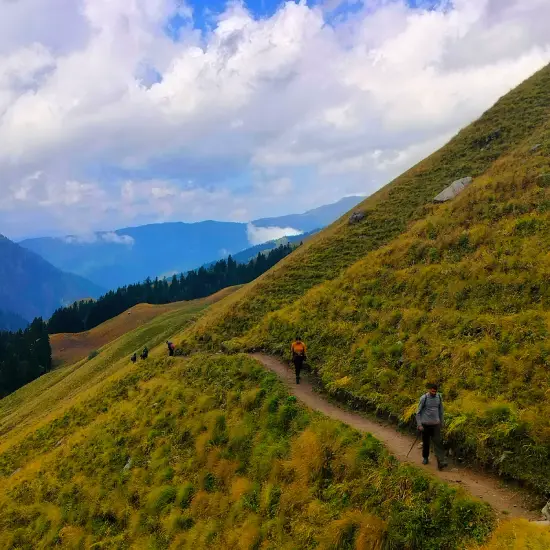Nepal Road Trip
- 7 nights & 8 Days
- 4200 m
- Easy to Moderate
- Nepal
Rs 30,500/-
Nepal a landlocked country situated in the lap of the divine Himalayas. Nepal is surrounded by India and China and attracts thousands of tourists every year from all around the world. Nepal is home to several mountain peaks including Mt. Everest, World’s Highest peak. Tourism is one of the largest and fastest-growing industries in Nepal, employing more than a million people and contributing 7.9% of the total GDP.The number of international visitors crossed one million in 2018 for the first time (not counting Indian tourists arriving by land). Nepal’s share of visitors to South Asia is about 6%, and they spend much less on average, with Nepal sharing 1.7% of the earnings. Premier destinations include Pokhara, the Annapurna trekking circuit, and the four UNESCO world heritage sites—Lumbini, Sagarmatha National Park (home to Mount Everest), seven sites in the Kathmandu Valley collectively listed as one, and Chitwan National Park. Most of Nepal’s mountaineering earning comes from Mount Everest, which is more accessible from the Nepalese side.
Day 1: Arrival in Kathmandu

The day will start with the arrival of our guests and fellow travellers in Kathmandu airport. Our representative will be there to receive you and transfer you to the hotel. You can spend your day around chilling in hotel or can take a walk around the market to know more about the place. After dinner, stay overnight in Kathmandu.
Day 2 : Kathmandu to Chitwan National Park

- 5 Hours
- 170 km
Today, after breakfast we will drive from Kathmandu. Today we will enjoy a scenic ropeway ride to visit the Manakamana Devi Temple – a sacred place of the Hindu Goddess Bhagwati, an incarnation of Parvati. After visiting Manakamna Temple, we proceed to Chitwan – the first National Park of Nepal. It is a UNESCO world heritage site. In the evening we enjoy the Folk dance of Nepal. We will stay overnight in Chitwan after dinner.
Day 3: Chitwan National Park

- 2-3 Hours
- 10-15 km
Today we will explore, Chitwan National Park – a land popular for One-horned Rhinoceros and Elephant farms. We will enjoy thrilling activities like jeep safari and canoe rides. After spending our time roaming in Chitwan National Park, we will return to our stay. After having dinner and recalculating the memories we made today, we will retire to our sleep.
Day 4: Chitwan National Park to Pokhara

- 4-5 Hours
- 148 km
After breakfast in the morning, we will proceed to Pokhara. Pokhara is a beautiful city nestled at the foothills of Annapurna Himalayan Ranges. We will enjoy the scenic views of our drive. Upon arrival, we visit we enjoy a pleasant boat ride in Phewa Lake – reflecting the panoramic views of Mt. Fishtail. Later on, we will visit Barahi Temple – located on an island in Phewa Lake. After visiting all the spots marked for today we willcheck in at hotel and stay overnight in Pokhara.
Day 5: Explore Pokhara

- 2-3 Hours
- 15 km
We will get up early in the morning and after breakfast, we will leave to witness the lively sunrise at Sarangkot Sunrise Point. Later we explore Pokhara city, we visit Devi’s Fall and Gupteshwar Caves. Further we visit Vindyabasini Temple, International Mountaineering Museum and its three main exhibition halls, Hall of Great Himalayas, Hall of Fame and Hall of World Mountains.
Day 6: Pokhara to Kathmandu

- 6 Hours
- 207.9 km
After breakfast, we will drive back to Kathmandu City today. It is quite a long stretch of distance to travel to Kathmandu. Upon arrival, we will check in at the hotel. You can spend your free time roaming around the market. After having a quaint evening , we will return to our stay and retire to sleep after dinner.
Day 7: Kathmandu

- 2 Hours
- 15 km
We will have an easy day exploring the Kathmandu city , after breakfast. We will visit Pashupatinath Temple, one of the 12 Jyotirlingas and the only one to be located outside India. Later on we will visit monuments of Kathmandu like, Budhanilkantha also known as “Sleeping Vishnu.” After having lunch , we will further visit Kathmandu Darbar Square and Swayambhunath Stupa – one of the glorious stupas in the world whose establishment is linked to the creation of Kathmandu valley. In the evening, we have free time for shopping in local market and also a get-together with our travel companions. We will return to hotel and stay overnight in Kathmandu.
Day 8: Kathmandu to Airport Departure

- 30 Minutes
It is time to bid goodbye to Nepal and return to your hometown. After breakfast, you will be transferred to the airport to board your flight depending on your departure schedule. We will see you off at the airport and see us off until next time.
Points to Remember
- Accommodation provided will be based on the category choice of your package with us.
- Meals are provided based on the Modified American Plan i.e. breakfast and dinner remain included in the package.
- Transportation will be there based on the number of people joining for the trip either with the group or customised trip.
- Travel Guide will be there on the trip to enhance your experiences with the knowledge of the place you will visit.
- Medical facilities will be there like oxygen cylinders in case of high altitude areas along with a small first aid kit for quick response incase of emergency.
- Personal Expenses during the trip have to be paid by the guest himself.
- Lunch will not be included during the sightseeing.
- Tips given to drivers or porters etc will not be covered under the package cost
- Activities like skiing, Shikara rides, horse rides etc will be on an extra fare basis.
- Vehicle: Choose a vehicle suitable for the terrain. Consider a 4WD for off-road adventures.
- Documentation: Ensure you have all necessary travel documents, including your passport, visa, and driving permit (if applicable).
- Permits: Research any required permits for specific regions or national parks.
- Maps and Navigation: Download offline maps or consider a GPS device in case of limited internet access.
- Safety: Be aware of road conditions and traffic regulations. Drive cautiously and respect local driving customs.
- Health: Research any necessary vaccinations and consider altitude sickness prevention if traveling to high-altitude areas.
- Base Layers: Pack 2-3 pairs of quick-drying, breathable thermals for temperature regulation.
- Mid-Layers: A fleece jacket or windcheater is essential, and a down jacket is recommended for high-altitude areas or colder seasons (below -5°C).
- Footwear: Choose sturdy hiking boots with good ankle support for uneven terrain. Opt for sandals or light shoes for warmer regions.
- Socks: Pack 2-3 pairs of comfortable, moisture-wicking socks.
- Clothing: Bring 2-3 sets of warm clothes like sweatshirts, pullovers, or light fleece jackets. Don’t forget comfortable trekking pants or convertible hiking pants.
- Headwear: Pack a sunhat, a warm beanie for cooler temperatures, and a bandana for versatility.
- Sun Protection: Sunglasses and sunscreen are crucial for Nepal’s strong sun.
- Essentials: Pack a first-aid kit, hand sanitizer, lip balm, and a water bottle.
- Plan your route: Decide on your itinerary and research destinations, including accommodation options.
- Be flexible: Be prepared to adapt to changing weather conditions or unexpected road closures.
- Embrace the culture: Immerse yourself in the local experience by trying local food, interacting with the people, and respecting cultural norms.
- Leave no trace: Be environmentally responsible by minimizing waste and respecting the natural beauty of Nepal.
We will be visiting eco-sensitive areas while trekking, using some small practices can minimize the impact of our visit to these areas. Here are some important yet ignored facts that can help us to keep the environment intact:
Stick to Established Trails
- Stay on Trails: If we use the existing trails to walk on, it will not tamper with the local vegetation and keep the life of microorganisms in the area safe.
- Avoid Shortcuts: If we take shortcuts, it can destroy the plantation and disturb the ecology.
Minimize Campfire Impact
- Using a Stove: We will carry a portable camping stove instead of a campfire to cook food. We won’t light fire unnecessarily just to avoid the destruction of nature and let our bodies adjust to the temperature.
- Fire Regulations: If in any case fire has to be lit, we will use established fire rings to keep the fires small. We will ensure they are completely extinguished before leaving.
Dispose of Waste Properly
- Leave no trace: We will Carry all the trash out with us, including food scraps and packaging. If you find any kind of wrapper or trash on the trail, you can pick it up and hand it to us at the campsite to get it disposed of properly.
- Human Waste: You can use restroom facilities where available. In remote areas, dig a cat hole (6-8 inches deep, at least 200 feet from water sources, trails, and campsites) and cover it properly after use. Using wet wipes is harmful thing for the environment, you can Consider using biodegradable toilet paper.
Respect Wildlife
- Keep a Distance: We can Observe the animals from a distance to avoid disturbing them, chasing them will not be considered as the right thing to do.
- Do Not Feed Animals: Feeding wildlife can disrupt their natural behaviours and diet.
Leave What You Find; Enjoy the things from where they are
- Take Only Memories: Do not take the rocks, pluck plants, and pick other natural objects as you find them to preserve the environment.
- Avoid Disturbing Historical and Cultural Sites: Respect any cultural or historical artefacts you encounter.
Reduce Use of Pollutants
- Eco-friendly Products: You can use biodegradable soap and avoid contaminating water sources.
- Minimize Noise Pollution: Keep noise levels low to avoid disturbing wildlife and other trekkers.
Travel in Small Groups
- Limit Group Size: Trekking is a smaller group that has less impact on the environment.
Educate Yourself and Others
- Learn and Share: Educate yourself about Leave No Trace principles and share this knowledge with fellow trekkers.
Support Conservation Efforts
- Contribute to Local Conservation: You can support organizations and initiatives that are working towards preserving natural areas.
Upcoming Tours
This can be your next getaway for your upcoming vacations

SPITI VALLEY ROAD TRIP
A thrilling journey to the Land of Lamas offering scenic views of the Himalayas, Buddhist culture and architecture .

NEPAL ROAD TRIP
A country on the southern slopes of the Great Himalayan ranges offering you culture, tradition and scenic views.

CHANDARNAHAN LAKES TREK
A trek in the outskirts of Shimla taking you closer to the nature and inner realms of Shimla.
Call us for a free quote
We are here to plan your upcoming adventure, give us a call today!
For travel related queries
Info@highinhimalayas.com
Phone
+91 78765 96443
+91 97360 82255
Address
Cabin No. 501, PC Chambers, Near Jodha Niwas Parking, The Mall Road, Shimla, Himachal Pradesh 171001





